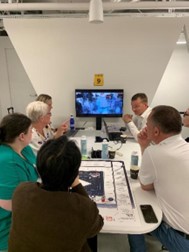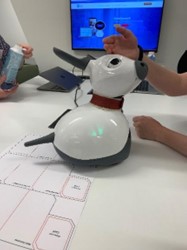The recent Co-Creation Workshop on Healthcare Robotics organized by Robotics4EU at OsloMet – Oslo Metropolitan University was a great success.
The workshop was hosted by The Danish Board of Technology in collaboration with OsloMet and NTNU, and brought together over 50 participants, including robot developers, end-users, and stakeholders, to explore the potential of robotics in healthcare. Through lively discussions and meaningful interactions, the workshop aimed to shape the future of robotics while fostering innovation and responsible development in the field.
Bringing Different Perspectives Together:
The workshop served as a meeting point for diverse minds in the robotics community and potential future end-users. Participants represented diverse backgrounds and expertise, ranging from technologists to healthcare professionals. This blend of perspectives enriched the discussions and fueled the exchange of ideas.
The objective of the workshop was to use real-world examples of healthcare robots as cases to facilitate insightful discussions among both those who develop the robots and those who will be using them, with a particular emphasis on fostering a broader acceptance among users and society and ensuring better integration of the robots.
During the workshop, all participants were divided into 9 different groups to focus their discussion on one specific robot as a case for the discussion. The different robots were the following:
- Lifeline Robotics – Automated throat swab robot
- No Isolation and OsloMet – AV1, a telepresence robot for remote learning.
- IDmind – The robot HARMONY is an assistive robot for Repetitive and on-demand deliveries, manipulation of small objects and social interaction.
- IDmind – Elmo is a tabletop solution developed to be an embodiment of telepresence or interface.
- Intuitive and Lancaster University – Surgical robot for minimally invasive surgery.
- Jodacare – Social robot that uses AI to keep elderly people less lonely.
- University of Southern Denmark – home-based rehabilitation robot for physiotherapy.
- Autonomous units – Disinfection robot.
- Miro-E and University of Hertfordshire – A pet-like robot that can function as a remote learning and teaching tool.



At the centre of each workshop was a discussion tool designed and developed by The Danish Board of Technology. The tool was designed to help facilitate the group discussions in a way that allow participants to assess different aspects of societal acceptance of the specific robotic solutions presented at the workshop. The tool helped and encouraged developers and end-users to talk about important societal topics: ethics, socio-economics, data, legal and engagement.
The discussions were thought-provoking and covered a wide range of topics, opportunities, and challenges. The enthusiasm and engagement of everyone involved truly made it a valuable experience.
Exploring Key Themes:
During the workshop, participants engaged in discussions encompassing various themes, highlighting the multi-faceted nature of robotics in healthcare. Ethical considerations emerged as a prominent topic, with participants discussing the challenges, barriers, and potential solutions to ensure a human-centric approach. The workshop stressed the significance of the early involvement of end-users in the development and implementation of robotics solutions to foster trust and familiarity.
Socio-economic implications of healthcare robotics were also thoroughly discussed. Contrary to concerns of job displacement, the general agreement was that robotics would strengthen the capabilities of healthcare workers, relieving physically demanding and stressful tasks. The discussions highlighted the potential for job creation and the importance of comprehensive training programs to facilitate a smooth transition and build trust in the workforce.
Data security and privacy emerged as a critical focus area. Privacy concerns were addressed, emphasizing the importance of user control and creating user-friendly interfaces. The workshop emphasized the importance of robust cybersecurity measures to protect sensitive healthcare data. Participants deliberated on data collection, storage, and protection, underscoring the need for adherence to privacy regulations and industry best practices. Legal matters also received attention. Participants explored liability issues in the context of healthcare robotics and the complexities associated with accountability. While some participants felt less qualified to contribute to legal discussions, valuable insights were gained, shedding light on the complex nature of navigating legal frameworks in this domain.
Gaining Valuable Insights:
The workshop served as a platform for the Robotics4EU project to gain valuable insights and perspectives. By facilitating discussions and interactions among experts, stakeholders, and end-users, the project obtained a deeper understanding of the challenges, opportunities, and concerns surrounding the development and deployment of robotics solutions in healthcare.
The workshop managed to give valuable insights and recommendations for further research and development of the robots participating in the workshop. Through the in-depth discussions, participants gained a deeper understanding of the importance of involving user expectations and requirements. Armed with this knowledge, we hope to empower robot developers to take further steps in enhancing their robots, ensuring they remain aligned with the ever-changing needs of users and society.
The Robotics4EU project will use these insights to write a comprehensive workshop report which will be published later this year. Some of the findings from the workshops will also leverage into the current development of an online tool called the RoboCompass which will enable robot developers and manufacturers to evaluate and enhance the responsible design of their robots. The first version of the RoboCompass was launched on Thursday 6th of July, and is available now!









